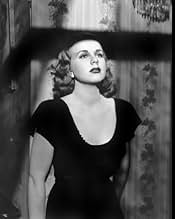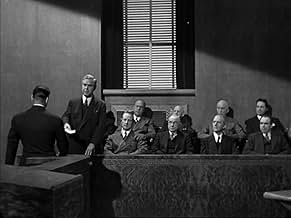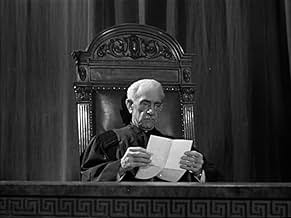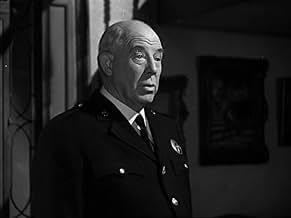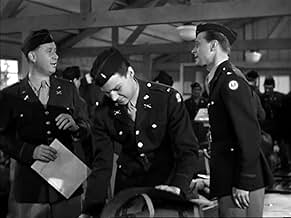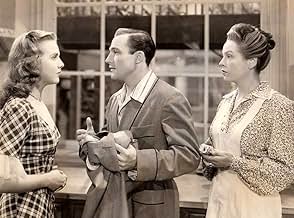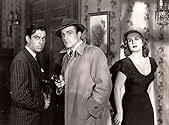IMDb RATING
6.5/10
1.8K
YOUR RATING
A young femme-fatale realizes that the man she married is an incorrigible wastrel.A young femme-fatale realizes that the man she married is an incorrigible wastrel.A young femme-fatale realizes that the man she married is an incorrigible wastrel.
- Director
- Writers
- Stars
- Nominated for 1 Oscar
- 1 nomination total
Eddie Acuff
- Steve
- (uncredited)
Fred Aldrich
- Bartender
- (uncredited)
Frank Austin
- Jury Member
- (uncredited)
John Barton
- Concertgoer
- (uncredited)
Vangie Beilby
- Wedding Guest
- (uncredited)
John Berkes
- Waiter
- (uncredited)
Oliver Blake
- Defense Attorney
- (uncredited)
Charles Cane
- Joe
- (uncredited)
Wheaton Chambers
- Plane Passenger
- (uncredited)
Ruth Cherrington
- Concertgoer
- (uncredited)
James Conaty
- Concert Patron
- (uncredited)
- Director
- Writers
- All cast & crew
- Production, box office & more at IMDbPro
Featured reviews
"Christmas Holiday" (Universal, 1944), directed by Robert Siodmak, is an interesting drama with "film noir" elements, (based on the story by W. Somerset Maugham which changes the local from Paris to New Orleans), starring two performers long associated with musical-comedy, Deanna Durbin and Gene Kelly (on loan from MGM), in their only film together. Deanna Durbin's long awaited dramatic role, with two songs thrown in for good measure, might have earned her an Academy Award nomination, but didn't. Due to its lack of television revivals during the last couple of decades, "Christmas Holiday" just remains only a memory to anyone who has any recollection of ever seeing it.
The story begins with Lieutenant Charlie Mason (Dean Harens) about to have Christmas leave from military service to return home and marry his fiancée, Mona, but he receives a letter written by her that reads that she has married someone else. When his plane lands in New Orleans due to a bad rainstorm, Mason, quite depressed, makes the acquaintance with Simon Fenimore (Richard Whorf), a reporter, who invites him to accompany him to a night club managed by Valerie De Merone (Gladys George). While there, Mason meets Jackie Lamont, a night club singer (Deanna Durbin), and after she finishes vocalizing, "Spring Will Be a Little Late This Year," Jackie has Mason accompany her to a church. During the Mass, she starts to break down and cry. Mason covers up by placing his coat over her. He then escorts this troubled girl to a diner where she tells him her story: (Flashbacks reveal Jackie to be Abigail Martin. She meets Robert Manette (Gene Kelly). They fall in love and are soon married. Their marriage is happy and blissful for six months until Abigail learns that her husband, a troubled gambler, has just murdered his bookmaker. Abigail goes through a series of unpleasant circumstances during her husband's trial, especially when Robert's domineering mother (Gale Sondergaard) gives her a hard slap across her face for not having been a stronger influence on him after her son is found guilty and sentenced to serve time in prison.) Forwarding to the present: Abigail finishes her revealing story to Mason. She later learns that Robert has escaped from prison and is out to get her, adding more to her troubles.
When I first saw "Christmas Holiday" in one of its very rare television presentations on a PBS channel in 1982, I was moved by it and Durbin's performance from start to finish, and have never forgotten it. Possibly watching this movie again after so many years, I would not have that same reaction I had the first time, but otherwise, it still brings a new kind of experience in seeing Durbin in a serious role, that shouldn't go unnoticed. Durbin sings two songs, "Spring Will Be a Little Late This Year," and her lovely rendition to Irving Berlin's "Always." I was even surprised to find Gene Kelly playing a role against type. Still new to movies (making his debut in 1942), his dramatic acting comes off somewhat awkward. I've seen Kelly act in other serious roles, some good, some not, but his character in this production is definitely unsympathetic. He even gets a chance to carry a gun and use it in a shoot out. No dancing for him here unless he's dodging bullets bouncing from the floor. As for Gale Sondergaard, she looks too young to be playing Kelly's mother, a role that would have been far better suited to the likes of Margaret Wycherly (best remembered for her gangster mother role in James Cagney's in "White Heat" (1949)), but Sondergaard doesn't disappoint with her domineering performance over her "Momma's boy."
Also seen in the supporting cast is Universal contract player, David Bruce playing Gerald Tyler. Bruce would soon be elevated to Durbin's co-star in her only Technicolor musical, CAN'T HELP SINGING (1944).
Yes,"Christmas Holiday" is a rare find indeed, a different kind of Christmas story, the one that doesn't get to be added in the package of other Christmas movies that air annually on television, including all versions to "A Christmas Carol" (1938), "It's a Wonderful Life" (1946) and/or "Miracle on 34th Street" (1947). While this movie has never been presented on classic cable channels like American Movie Classics, it's currently available (as of 2006) in the VHS format and can be purchased through Movies Unlimited. I recommend seeing it, at least once, if not for its dramatic content, but for its casting. (***)
The story begins with Lieutenant Charlie Mason (Dean Harens) about to have Christmas leave from military service to return home and marry his fiancée, Mona, but he receives a letter written by her that reads that she has married someone else. When his plane lands in New Orleans due to a bad rainstorm, Mason, quite depressed, makes the acquaintance with Simon Fenimore (Richard Whorf), a reporter, who invites him to accompany him to a night club managed by Valerie De Merone (Gladys George). While there, Mason meets Jackie Lamont, a night club singer (Deanna Durbin), and after she finishes vocalizing, "Spring Will Be a Little Late This Year," Jackie has Mason accompany her to a church. During the Mass, she starts to break down and cry. Mason covers up by placing his coat over her. He then escorts this troubled girl to a diner where she tells him her story: (Flashbacks reveal Jackie to be Abigail Martin. She meets Robert Manette (Gene Kelly). They fall in love and are soon married. Their marriage is happy and blissful for six months until Abigail learns that her husband, a troubled gambler, has just murdered his bookmaker. Abigail goes through a series of unpleasant circumstances during her husband's trial, especially when Robert's domineering mother (Gale Sondergaard) gives her a hard slap across her face for not having been a stronger influence on him after her son is found guilty and sentenced to serve time in prison.) Forwarding to the present: Abigail finishes her revealing story to Mason. She later learns that Robert has escaped from prison and is out to get her, adding more to her troubles.
When I first saw "Christmas Holiday" in one of its very rare television presentations on a PBS channel in 1982, I was moved by it and Durbin's performance from start to finish, and have never forgotten it. Possibly watching this movie again after so many years, I would not have that same reaction I had the first time, but otherwise, it still brings a new kind of experience in seeing Durbin in a serious role, that shouldn't go unnoticed. Durbin sings two songs, "Spring Will Be a Little Late This Year," and her lovely rendition to Irving Berlin's "Always." I was even surprised to find Gene Kelly playing a role against type. Still new to movies (making his debut in 1942), his dramatic acting comes off somewhat awkward. I've seen Kelly act in other serious roles, some good, some not, but his character in this production is definitely unsympathetic. He even gets a chance to carry a gun and use it in a shoot out. No dancing for him here unless he's dodging bullets bouncing from the floor. As for Gale Sondergaard, she looks too young to be playing Kelly's mother, a role that would have been far better suited to the likes of Margaret Wycherly (best remembered for her gangster mother role in James Cagney's in "White Heat" (1949)), but Sondergaard doesn't disappoint with her domineering performance over her "Momma's boy."
Also seen in the supporting cast is Universal contract player, David Bruce playing Gerald Tyler. Bruce would soon be elevated to Durbin's co-star in her only Technicolor musical, CAN'T HELP SINGING (1944).
Yes,"Christmas Holiday" is a rare find indeed, a different kind of Christmas story, the one that doesn't get to be added in the package of other Christmas movies that air annually on television, including all versions to "A Christmas Carol" (1938), "It's a Wonderful Life" (1946) and/or "Miracle on 34th Street" (1947). While this movie has never been presented on classic cable channels like American Movie Classics, it's currently available (as of 2006) in the VHS format and can be purchased through Movies Unlimited. I recommend seeing it, at least once, if not for its dramatic content, but for its casting. (***)
Hmmm, I wonder of Tennessee Williams saw this in 1945 and wrote SUDDENLY LAST SUMMER as a riff on this astonishing incestuous masochistic noir. Universal's 1944 "Christmas Holiday"is a startling dark film that is quite explicit in its adult themes of prostitution, self punishment, sexual manipulation, incest and some quite twisted emotional ideas. It even has scenes similar to that same 1959 Taylor Montgomery Hepburn drama. Cleverly, Universal cast music stars Gene Kelly as the handsome spoiled son with the demon mother (Gale Sondergaard) and cherubic Deanna Durbin as the adoring slavish young woman that Mother encourages he marries to keep his amoral unethical character in check. The idea that Mother enthusiastically endorses their marriage so she can control both of them by their sexual desire for each other is a rank idea as slimy as seen in the pre code shocker THE SILVER CORD. I personally found the film riveting and I very much liked the casting against type. For me it gave the film excellent surprise value. Kelly made a terrific seductive rat. Durbin's slide into willing prostitution to 'be with him' in a decadent lifestyle (while he was away) is a great downbeat storyline. Everything about "Christmas Holiday" is deceptive, right from the happy title to the handsome horror of Kelly's character. I will not spoil the story for you other than to say the whole film is a terrific ride, and with a ripe explicit tone, you will be seduced yourself. Plenty of flashback like SORRY WRONG NUMBER and equally as creepy. What a surprise! Hilariously, in Australia it was our Nationwide TV treat at 8.30pm on Christmas night! Haven't our TV programmers got a sly sense of humor.
The two stars are Deanna Durbin and Gene Kelly so 1940's audiences seeing a title like "Christmas Holiday" may well have expected a musical. The surprise was a TKO, and people reeled under this somewhat cleansed version of the Maugham novel. A powerful drama, "Christmas Holiday" actually proves that Durbin could have been on the verge of a stellar adult career that would have included important dramatic roles. She is merely superb in this one as a 'dance hall singer-hostess' who is determined to suffer as much as her murderous, jailed, asocial husband, very well done here by Gene Kelly. Durbin sings two standards beautifully, but it is her ACTING here that boosts the attention. Robert Siodmak, one of our finest noir-ish directors, carries off this challenge with excellence. Dean Harens is an fine foil for Durbin in her quest for retribution. A Broadway actor, he sounds and acts in the Tom Drake-style, and that is a compliment. Gladys George, Gale Sondergaard, Richard Whorf work well under Siodmak. Perhaps the public wasn't ready for Durbin and Kelly as 'hostess' and 'psycopath', and that is a shame. Despite the whitewash of some of the novel's elements, this is a very very fine film, and Deanna Durbin, wherever you may be these days, you are to be sincerely commended. Thanks for this one!!
This is a strange noir, made even more so by the odd casting of the usually wholesome Deanna Durbin and Gene Kelly as a barely-disguised 'floozie' and an inveterate gambler and murderer respectively! Besides, the title is most ironic since, while it does revolve around just that occasion, the main narrative (which unfolds in flashback, a typical genre device, I might add) hardly evokes a feeling of good cheer – incidentally, this is possibly the only film set around this time of year to depict the Midnight mass traditionally held on Christmas Eve! Christmas HOLIDAY, then, was only director Siodmak's second noir: the result is somewhat pretentious for a movie from this vintage, yet this very quality has helped render it less dated than others of its ilk! I should point out that the late eminent British film critic Leslie Halliwell resented the script's approach to the source material – but, while this is unusually billed in the opening credits as "W. Somerset Maugham's Christmas HOLIDAY as written by Herman J. Mankieiwicz", the author himself was reportedly enthusiastic about the screen rendition!
For the record, I own 10 vehicles by the female lead (who actually initiated the project in an effort to change her child-star image!) but, more by accident than design, this is the first I have watched – and it appears that, not only was the film her personal favorite but also, in her opinion, the only worthy one she ever did! Incidentally, she would again dabble in the thriller genre with the more modest but still interestingly-cast LADY ON A TRAIN (1945), which I do have a copy of. By the way, the actress (who retired from the screen way back in 1948!) has just turned a venerable 90 years old in December! With respect to Kelly, this was his seventh picture (having debuted just 2 years previously) and, in his case, too, he would appear in only one other title in this vein i.e. BLACK HAND (1950), which I have also acquired some time back but have yet to catch up with. As for how the two fare within this seedy/gloomy environment, Kelly is quite good as a ne'er-do-well but Durbin (even though the studio bosses forced her into a couple of numbers – Frank Loesser's "Spring Will Be A Little Late This Year" and Irving Berlin's "Always", with the latter essentially turned into a motif throughout – to appease her established fan-base!) is surprisingly excellent.
Anyway, the plot involves Durbin and Kelly meeting at a concert (the 'Love/Death' theme from Richard Wagner's opera "Tristan And Isolde" – also effectively reprised here for the finale – which, for my money, has been immortalized in two Luis Bunuel films!) and immediately falling in love. When he takes her home to meet his mother (Gale Sondergaard in one of her best roles), the latter realizes the girl (who obviously is unaware of his character foibles) can help her make an honest man of her boy. However, events take a tragic turn as Kelly kills a man in a dispute over money, is caught, tried and condemned. Sondergaard, whose feelings for her son go far beyond motherly love(!), takes it out on Durbin for having failed her – which sends Durbin on her path to perdition (self-imposed, really, so as to be herself in a prison of her own making!) which is how we first see her, offering solace at a New Orleans "joint" to a soldier who has his own beef against love (in fact, he was on his way home to take revenge upon the fiancée who had just jilted him!).
Other prominent characters are the proverbial madam-with-a-heart-of-gold played by Gladys George and Richard Whorf as the sleaziest figure of all, a muck-racking reporter who also operates as something of a pimp in the latter's establishment! The climax, then, sees Kelly escape from prison and (understandably) misconstruing Durbin's particular method of expiation: however, the Law is soon on his tracks, and he dies in a shoot-out with the Police – his dying words to his wife, finally appreciating the nature of her sacrifice, are "You can let go now, Abigail" (promptly reiterated by the young soldier, looking on).
For the record, I own 10 vehicles by the female lead (who actually initiated the project in an effort to change her child-star image!) but, more by accident than design, this is the first I have watched – and it appears that, not only was the film her personal favorite but also, in her opinion, the only worthy one she ever did! Incidentally, she would again dabble in the thriller genre with the more modest but still interestingly-cast LADY ON A TRAIN (1945), which I do have a copy of. By the way, the actress (who retired from the screen way back in 1948!) has just turned a venerable 90 years old in December! With respect to Kelly, this was his seventh picture (having debuted just 2 years previously) and, in his case, too, he would appear in only one other title in this vein i.e. BLACK HAND (1950), which I have also acquired some time back but have yet to catch up with. As for how the two fare within this seedy/gloomy environment, Kelly is quite good as a ne'er-do-well but Durbin (even though the studio bosses forced her into a couple of numbers – Frank Loesser's "Spring Will Be A Little Late This Year" and Irving Berlin's "Always", with the latter essentially turned into a motif throughout – to appease her established fan-base!) is surprisingly excellent.
Anyway, the plot involves Durbin and Kelly meeting at a concert (the 'Love/Death' theme from Richard Wagner's opera "Tristan And Isolde" – also effectively reprised here for the finale – which, for my money, has been immortalized in two Luis Bunuel films!) and immediately falling in love. When he takes her home to meet his mother (Gale Sondergaard in one of her best roles), the latter realizes the girl (who obviously is unaware of his character foibles) can help her make an honest man of her boy. However, events take a tragic turn as Kelly kills a man in a dispute over money, is caught, tried and condemned. Sondergaard, whose feelings for her son go far beyond motherly love(!), takes it out on Durbin for having failed her – which sends Durbin on her path to perdition (self-imposed, really, so as to be herself in a prison of her own making!) which is how we first see her, offering solace at a New Orleans "joint" to a soldier who has his own beef against love (in fact, he was on his way home to take revenge upon the fiancée who had just jilted him!).
Other prominent characters are the proverbial madam-with-a-heart-of-gold played by Gladys George and Richard Whorf as the sleaziest figure of all, a muck-racking reporter who also operates as something of a pimp in the latter's establishment! The climax, then, sees Kelly escape from prison and (understandably) misconstruing Durbin's particular method of expiation: however, the Law is soon on his tracks, and he dies in a shoot-out with the Police – his dying words to his wife, finally appreciating the nature of her sacrifice, are "You can let go now, Abigail" (promptly reiterated by the young soldier, looking on).
What a surprise treat to see this rare film as part of a Robert Siodmak Festival at the Cleveland Art Museum in the summer of 2014. It put me back in the mid-WWII period and the beautiful, pristine 35mm print was shown as originally presented on the big screen, thanks to Film Curator John Ewing.
The major attraction here is that Deanna Durbin and Gene Kelly both play against type in a "doctored up" Somerset Maugham story. Siodmak direction is dark, atmospheric and smoothly executed throughout. Deanna sings Irving Berlin's "Always" in a pop style very effectively. A good portion of Wagner's "Liebestod" from Tristan and Isolde is heard in an orchestral setting to heighten the dramatic proceedings.
Both stars work surprisingly well in their very heavy roles, and I found myself glued to the screen during Durbin's depiction. Her acting style has often been subtle, and this performance was one of her most understated. Kelly's role challenged him to reach dramatic heights, and he rises to occasion.
While some of the script is dated, Deanna dominates the screen whenever she's on, and is matched by a fine supporting cast. Truly a worthwhile viewing.
The major attraction here is that Deanna Durbin and Gene Kelly both play against type in a "doctored up" Somerset Maugham story. Siodmak direction is dark, atmospheric and smoothly executed throughout. Deanna sings Irving Berlin's "Always" in a pop style very effectively. A good portion of Wagner's "Liebestod" from Tristan and Isolde is heard in an orchestral setting to heighten the dramatic proceedings.
Both stars work surprisingly well in their very heavy roles, and I found myself glued to the screen during Durbin's depiction. Her acting style has often been subtle, and this performance was one of her most understated. Kelly's role challenged him to reach dramatic heights, and he rises to occasion.
While some of the script is dated, Deanna dominates the screen whenever she's on, and is matched by a fine supporting cast. Truly a worthwhile viewing.
Did you know
- TriviaBecause of the Hays Code, screenwriter Herman J. Mankiewicz changed the setting from a Paris brothel to a nightclub in New Orleans, and changed the main character from a prostitute to a more ambiguous nightclub singer and hostess, in adapting the 1939 novel of the same name by W. Somerset Maugham.
- GoofsAfter Robert breaks out of jail, the newspaper spells his last name as "Mannette". However, the correct spelling is "Manette".
- Quotes
Simon Fenimore: [to Charles] The planes are all grounded, the trains won't do you any good, and you're too big for me to carry on piggyback.
- ConnectionsReferenced in Go, Johnny, Go! (1959)
- How long is Christmas Holiday?Powered by Alexa
Details
- Release date
- Country of origin
- Language
- Also known as
- Christmas Holiday
- Filming locations
- St Vibiana RC cathedral, Main St, Los Angeles, California, USA(midnight mass scene)
- Production company
- See more company credits at IMDbPro
- Runtime1 hour 33 minutes
- Color
- Aspect ratio
- 1.37 : 1
Contribute to this page
Suggest an edit or add missing content



